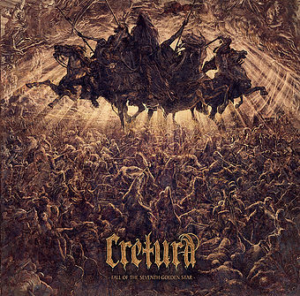Formed back in 2010 and inspired by the symphonic metal of Dimmu Borgir, Cradle of Filth and Nightwish, Cretura have spent the last six years honing their sound to a ferocious point. Signed to respected Italian label Worm Hole Death (The Way of Purity), the band spent a year developing the songs that would make their full-length debut, ‘Fall of the Seventh Golden Star’, and the time was well-spent. Produced by Wahoomi Corvi, who brings an enviable clarity to the band’s sound, the album is a powerful work that matches grand ambition with impressive musicianship and, over the course of eleven tracks, Cretura demonstrate the skill and the imagination to stand shoulder to shoulder with the bands that inspired them.
Opening with a short prologue rooted in the mysticism of Tolkien’s Elven Kingdoms, ‘Past, present and future’ segues into the martial beat of ‘reign of terror’ which sees an army appear on the horizon, clad in armour and smeared with the gore of its victims. The guitars rage, the choirs trill and, underneath it all, drummer Michael Sveri lays down a rhythmic backdrop that threatens to reduce your home to dust. Despite the searing blackened element of the music, there is melody here too, and lead singer Sara M. Guttorm is the band’s secret weapon. Opting for a cleaner vocal sound than, say, the more operatic leanings of former Nightwish singer Tarja, Sara is the perfect foil for the guttural roars of guitarist / vocalist Markus Jamie Oddekalv Pettersen, and the band balance brutality and beauty perfectly. Next is ‘Grand warfare through dark ages’, a full-frontal blackened assault that sees scarifying riffs and hurricane-strength drumming tear away the façade of civility and expose the blackened heart that beats at the core of the band. However, the band maintain their grasp on crucial melody and, as the track progresses, a rich Eastern element is unveiled that sees the song enveloped in the rich, exotic odour of middle-eastern spice. The air of dark romance is rent asunder by the discordant, blackened blast that is ‘voices of hunger’. A monstrous statement of intent, it leaves the listener breathless as the nihilistic fury threatens to overwhelm and plunge all into darkness. It’s not all blackened destruction, however. Rather than simply pummel the listener into submission, Cretura take the time to build an atmosphere for their songs, and ‘funeral roses’ opens with a beautiful prologue that adds great depth to a piece of music that draws a fascinating line between Nick Cave’s Kylie collaboration ‘where the wild Roses Grow’ and Dimmu Borgir at their most bombastic and sweeping. Similarly, ‘Northern winds’, which emerges amidst a mighty thunder storm, is a mighty symphonic effort full of rich choral backdrops and synth textures, whilst Sara’s vocal captures exactly the right level of strength and vulnerability, evoking the folk maidens of ages gone.
The second half of the album opens with the ferocious ‘pray for a brighter tomorrow’, which sees Sara and Markus delivering their vocals with an air of high drama over some of the most visceral riffs yet found on the album. In contrast ‘Når Lyset Dør’ slows the pace and adopts a darker tone, the guitars grinding in the dark as Michael builds to a punishing groove on a drum kit that sounds like it was built by the Gods. On album highlight, ‘At The eleventh hour’, the band weave a prologue into the track itself, with haunting violin, picked guitar and choral elements layered beautifully together with winding synth, only for a scything guitar riff to tear the atmosphere to pieces and plunge the listener headlong into a churning maelstrom of taut riffing and skull-flattening percussive blasts. It all leads perfectly toward the thunderous cavalry charge of ‘the pale horseman and the hunter of the sky’ which sounds all the more invigorating after its more symphonic predecessor and, as the drums gallop around the listener, so the guitars and synths coalesce, weaving a web around the listener that lends a surreal air to the song – as if it is evoking a memory long shrouded in the amnesia of multiple lives lived since the events described in the music took place. In stark contrast, ‘the last song of the earth’ is a short, beautiful lament that sees Sara’s voice set against a naked piano in a moment of simple serenity that draws the album to a beautiful close and draws an elegant line under the loose conceptual framework that runs through the album.
From the off, ‘Fall of the Seventh Golden Star’ does not sound like a debut album. There’s a restless creative spirit at work, to be sure, but that is tempered by impressive quality control that sees each track moving the album forward and barely an ounce of filler to be found anywhere. The band use their vocal talents carefully, drawing upon Sara’s voice enough to sweeten the pill, but always maintaining the threat of Markus’ blackened roar to make sure that the edge of their blade never dulls under a surfeit of symphonic elements. Memorable, with a carefully developed narrative thread at its heart, ‘Fall of the Seventh Golden Star’ is a fantastic work from a band who will surely see their following grow in the coming months. Opulent, inventive and beautifully recorded, ‘fall of the seventh golden star’ is an album you’ll want to play over and again and is not one to miss. 9




